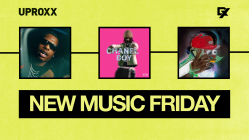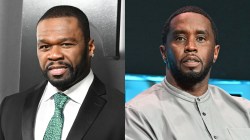On Sept. 11, 2011, Hit-Boy put it into the universe that he was going to produce a Rihanna single and three songs on a Nas album. What he initially manifested 12 years ago has developed into a legit musical bond unseen before from a young, hotshot producer and a grizzled, legendary rapper. In just three years, Hit-Boy and Nas have created six albums and two trilogies, totaling 80 songs. Magic 3 is the final album between the two, released on Nas’ 50th birthday, as a symbol of aging gracefully with no time limit to his success.
It’s unfortunate that Hip Hop and longevity don’t have more positive connotations, creating this idea that once you reach a certain age, your rapping skills diminish. Granted, many of the greats don’t go out on top (for every 4:44 there’s a Crown Royal). But Nas, who we’ve been listening to for almost 30 years, has re-written that narrative by releasing both his King’s Disease and Magic series congruently. The pocket he’s in with Hit-Boy is like Killer Mike meets El-P, two spiritually connected souls who become better versions of themselves every time they work on music together. It’s why fans didn’t seem surprised when Nas said he was halfway through his next one on “Abracadabra” from Magic 2, as their spark continues to produce some of Nas’ best material in years.
Magic 3 is the final parting gift for fans, as Nas says goodbye (for now) to this producer-rapper pairing. The album represents a milestone for Nas reaching 50 during 50 years of Hip Hop, an audio journal of his accomplishments, his reflections on surviving life and lessons learned, reveling in Black excellence, and his dedication to the art form by bucking the trends. But aside from a few confessions and a song that acts as an acknowledgment section, Magic 3 mostly just sounds like another solid Nas and Hit-Boy collab, but without a doubt their least interesting material of the series. This album lacks new direction and feels like leftover tracks of Magic 2 packaged together as an add on. For a franchise coming to an end, the songs chosen for Magic 3 don’t satisfy enough to believe they’re hanging their jerseys up in the rafters for good.
That doesn’t mean it’s not a quality project, and the throughline of Nas reflecting on turning 50 does add a little bit of differentiation between the other entries. Hit-Boy still provides Nas with a compelling arsenal of cinematic samples, chopping up with beat breaks for him to flow seamlessly from one subject to the next. His signature knock on these beats (“Superhero Status,” “Blue Bentley,” “Never Die” featuring Lil Wayne, “Jodeci Member”) are much more front-facing, like he was saving them for this moment. Hit has clearly established possibly the most trust any producer ever has with Nas, leading to the Queensbridge rapper being comfortable with revealing untold thoughts and feelings that he may have once kept off record, evidenced by his confessions on “I Love This Feeling.” “They askin’ if I’m ever gon’ be over rap / But I left a few times, just never told you that,” he admits, one of the many new revelations he puts on wax. Hit-Boy pushes Nas to unpack the meaning behind turning 50, using inventive sample loops and beat switches like on “Japanese Soul Bar” to spill his heart out.
By this point, the worlds of Hit-Boy and Nas have merged to create their own universe. Their histories and backstories have been heavily documented in Hip Hop, throwing in references to “Represent” from Illmatic on “Fever” (named after the nightclub Nas performed at in 1993), unearthing Nas’ first interview with Video Music Box on “Japanese Soul Bar,” or using one of Hit-Boy’s producer tags with Nipsey Hussle’s voice on “Sitting With My Thoughts.” Nas is in competition with himself when it comes to his love for Rap, reinforcing his knack for street storytelling on the two-part “Based on the True Events,” that could be reimagined as a mini-movie.
It’s hard to offer constructive criticism to an artist such as Nas, who explicitly addresses keyboard warriors and Rap critics on “TSK,” threatening violence to those who talk recklessly. But after this much material, it’s getting easier to poke holes in the Nas and Hit formula. Lines like calling himself “Chief Keef Cozart mixed with Mozart” sound like he’s rhyming just because he’s good at it, putting his interests first and stretching the imagination of what fans want to hear from him versus what they can tolerate. On “Pretty Young Girl,” he outlines his refined interests in a woman he is pursuing, but it comes off more “Certified Lover Nasir” than “Cherry Wine.” On “Speechless, Pt. 2,” Nas raps about artificial intelligence, which is pretty bad. “A.I. is only here to replicate and control / Imitatin’ the original then grabbed them a mold / Of the binary code, it’s your patterns they stole / This my tactical flow, the one they can’t redesign / You can redo the voice but you can never read my mind,” he raps. When you claim you’re both “old NY” and “new NY” like on the Lil Wayne-assisted “Never Die,” it offers a chance to update your lyrical content. However, Nas should know his audience enough that they want to hear him bring rap justice and rap the same way as he was on the block, not these half-baked bars about the bleak future of the music industry.
On the closer “1-800-Nas&Hit,” Nas compares the King’s Disease and Magic series to the boxed sets of the Star Wars and Fast & Furious franchises. The number is on an “infomercial” for fans to call them and leave a message, letting them know when they should return. It’s a celebratory song in nature, a victory lap to allow credits to roll. As the song closes out, he thanks everyone involved in the making of these albums, similar to J. Cole’s “Note to Self” and Kanye West’s “Last Call.”
Magic 3 is another chapter that doesn’t quite surpass the original, but it’s the swan song before his decision to retire. It’s not exactly the blockbuster conclusion Nas fans were looking for. Instead, it’s the cliffhanger ending that offers the chance for a reunion in the future. But for an artist who was written off several times in his career, and even himself wrote off the genre he helped popularize completely, Magic 3 puts the stamp on one of the most interesting late-career series in Hip Hop history, a feat that may never be duplicated.










Nas deservedly wrote TSK for reviewers like you. That’s all I have to say on this trash review of what is a great album.
Facts 💯
Respectfully this IS the conclusion to the series we were hoping for. This album is AMAZING and that sentiment is shared by true Nas fans…
Respectfully this IS the conclusion to the series we were hoping for. This album is AMAZING and that sentiment is shared by true Nas fans…
Review is garbage!!!!!
I loved the album. It feels like a celebration of his 50th birthday. He feels above the younger generation of emcees. He sounds wise and his flow is still sharp. It would feel strange if Nas were to rap like his 22 year old self on it was written. He has aged gracefully and he doesn’t rhyme to rhyme again. He’s more interested in making good records, writing good songs and material that will age gracefully.
No other emcee seems to be on this path.
Agreed this is a garbage review. How you gonna review this album and not speak to the best Weezy feature we’ve have gotten in a long time. The album was solid…. All of them were from these 2 series. Obviously there will be some misses out of 80 plus tracks… But these are mostly hits. His bars about A.I. were dope. .I would love to see him do albums with Premier next or 9th Wonder.
Don’t Just comment supporting Nas.. You have to RATE the album. That’s the point
4/5 is my rating
You must’ve been high on Meth and banging your sister while listening to the album. Easily 4.5 out of 5.
I say Magic 3, Magic, KD 3, KD 2, Magic 2, KD 1. I think the quality of the six releases is evidenced by the fact that KD 1 won a Granny yet, it’s arguably the weakest of the two trilogies. And the album you consider mediocre is clearly one of the best 3, if not the absolute best. Your review doesn’t take it’s own advice. Your writing is repetitive, convoluted, shortsighted and lacking credibility.
This review is trash. This album is the best of the whole run.
This review is trash. This album is the best of the whole run.
I see theyz a lot of NAS haters out there, who all about trashin him but they can’t keep a good man down. Magic 3 is 🔥🔥🔥🔥🔥
This is the worst review I heard in my life. What are expecting from this man 6 albums in three years I can divide. Go back to listening to that bullshit. You don’t need review Nas no more.
This is the worst review I heard in my life. What are expecting from this man 6 albums in three years I can divide. Go back to listening to that bullshit. You don’t need review Nas no more.
Damn I actually thought it was no denying this album. And HipHipDriderX did just that. I actually thought that y’all would give this a 5 out of 5
This is great album! This site never give Nas any good review on his albums so who cares what they think! We like it and that is all what matters! Nas GOAT
we gave Magic a 4.3… what are you talking about…
Y’all understand that 3.8 – 4.4 are high scores right?
Give it up. Nobody is feeling this goofy “review.”
This review is trash, Magic 3 is easily a 4/5 album. This is far better than Magic 2 which is just decent at best imo.
Damn. That review was really bad. Magic 3 is awesome
5/5 easy it’s on repeat
The album is nothing short of magic. Definitely a masterpiece… 5/5
Why yall keep $hitting on Nas? Every drop…yall give some weak ass irrelevant review and then turn around and praise garbage.
Why yall keep $hitting on Nas? Every drop…yall give some weak ass irrelevant review and then turn around and praise garbage.
This Review is completely disengenuos be disrespectful..
MAGIC 3 is Amazing.. A Flawless album ..
It’s – 5/5
This Review is completely disengenuos be disrespectful..
MAGIC 3 is Amazing.. A Flawless album ..
It’s – 5/5
Album is amazing. 5 out 5. The reviewer needs another listen.
This Review is Absolutely Disingenuous and just WRONG.
MAGIC 3 is a Masterpiece .
An Amazing Albums..
It’s a 5/5
Anybody thinking this is worse than Magic 2 is crazy.
idk i agree magic 3 is better but magic 2 was dope imo, i actually think magic 2 is better than the OG magic but mainly because the first Magic is only 9 tracks or whatever
KD=Magic 3>KD 2>Magic>KD3>Magic 2. So in conclusion, he ended it on a strong note. If KD is the superior of the KD series, Magic 3 is equal if not harder.
“Leftover tracks from Magic 2” – That statement right there discredits this entire review.
Magic 3 sounds nothing like Magic 2. Magic 2 has no real theme besides “Magic” references. Magic 3 is a reflection of his life and career..
The beats on Magic 3 are heavy with soul samples and chops. Its way more layerd both lyrically, conceptually andnwith instrumentation.
Magic 2 has just a couple of soul samples and lyrically its not really conceptually based.
If anything, Magic 2 has leftover tracks from Magic 3. Yes, I believe Magic 3, (maybe it wasnt called Magic 3 while in production, was being created ) was being produced and then they cut songs . With the cut songs decided on Maguc 2 and Magic 3. Just my opinion. But Magic 3 seems way more intentional with production and rollout.
Either way, your so off in your review and that statement kind of shows it.
You guys have the worst reviews. You used to be my go to source through my college years. But now you guys are terrible. This is no less than a 4. To give 4:44 a 4.5 and this 3.8 is a joke.
You guys have the worst reviews. You used to be my go to source through my college years. But now you guys are terrible. This is no less than a 4. To give 4:44 a 4.5 and this 3.8 is a joke.
You guys have the worst reviews. You used to be my go to source through my college years. But now you guys are terrible. This is no less than a 4. To give 4:44 a 4.5 and this 3.8 is a joke.
“Leftover tracks from Magic 2” – That statement right there discredits this entire review.
Magic 3 sounds nothing like Magic 2. Magic 2 has no real theme besides “Magic” references. Magic 3 is a reflection of his life and career..
The beats on Magic 3 are heavy with soul samples and chops. Its way more layerd both lyrically, conceptually andnwith instrumentation.
Magic 2 has just a couple of soul samples and lyrically its not really conceptually based.
If anything, Magic 2 has leftover tracks from Magic 3. Yes, I believe Magic 3, (maybe it wasnt called Magic 3 while in production, was being created ) was being produced and then they cut songs . With the cut songs decided on Maguc 2 and Magic 3. Just my opinion. But Magic 3 seems way more intentional with production and rollout.
Either way, your so off in your review and that statement kind of shows it.
100% accurate. Btw I enjoy you guys on YouTube as well.
I knew reviewers will be cautious since Magic 2 came not that long ago, and the album is set for Nas and HipHop 50 years Bday so may feel rushed to meet a deadline… BUT it is not the case!
Magic 2 was experimental, transitional, and by definition will be the one that divide the most (more depth to that cover…)
Magic III is NOT Nas channeling his Illmatic times like he did on the first Magic , however It is Nas x Hit Boy celebrating their classic run, and showing a New School and Old School how great HipHop sounded like (Magic), how great his evolution has been (Magic 2). 50 Years later…What we fell in love with in the late 80’s is still making Magic! Thank You Hip Hop! Thank You Nas! and Happy Birthday to Us All!!! 🔥‼️🔥
Smh. Y’all love hating on Nas. Magic 3 is a classic and it’s definitely the best of the Magic series. It deserves a 5 out of 5. Y’all are so garbage. Seriously. Nas is the greatest ever to touch the mic and ya’ll never give him his respect.
Smh. Y’all love hating on Nas. Magic 3 is a classic and it’s definitely the best of the Magic series. It deserves a 5 out of 5. Y’all are so garbage. Seriously. Nas is the greatest ever to touch the mic and ya’ll never give him his respect.
🔥
Y’all have been really trash for a long time. Terrible review from a label run “ hip hop” gossip site.
Y’all have been really trash for a long time. Terrible review from a label run “ hip hop” gossip site.
Trash review. Magic 3 is a Classic.
“but without a doubt their least interesting material of the series”
Imagine such a lame statement.
You guys have some nerve disrespecting Nas always with your run of the mill ratings and reviews of his albums.
This album is an instant classic
This album is a classic and the reviewer should be fired.
This reviewer is respectfully on drugs!
“It’s hard to offer constructive criticism…” Goes on to dump a pile of garbage.
This is the problem with hard drugs, fam. Total loss of coherence. Fuck outta here!
Lame-ist review I’ve read so far. Album is easily 4.3/5 at minimum. NERD.
Who keeps letting this LOSER Erick Diep review Hiphop albums he’s trash 🚮 & clearly doesn’t no great music when he hears because he’s not from our culture this Nas album is phenomenal & while Magic 2 was good & not great Magic 3 is superb this is the same guy who gave Lloyd Banks a low rating as well keep this vulture away from our culture this album is 5/5
Who keeps letting this LOSER Erick Diep review Hiphop albums he’s trash 🚮 & clearly doesn’t no great music when he hears because he’s not from our culture this Nas album is phenomenal & while Magic 2 was good & not great Magic 3 is superb this is the same guy who gave Lloyd Banks a low rating as well keep this vulture away from our culture this album is 5/5
Lots of 5s but it says 2.5 absolutely shit journalism here, god bless the wank, its 4.2/5 to me
Lots of 5s but it says 2.5 absolutely shit journalism here, god bless the wank, its 4.2/5 to me
Great album to close this historic run!
Magic 1 & KD3 are vinyl worthy. It’s been a strange ride, but damn am I grateful for it. The gap between Life is good and Nasir was painful.
This review is garbage, TSK is for u self acclaimed music wiz who lacks the ability to think critically, they always miss the message. I’m a fan and I love the album, good way to close the chapter.5/5
If they rate Diddy’s album (which actually isn’t a bad post-90/00s era Diddy project) higher than M3 then I’m done with HH
To write a review with a thoroughly developed bias of which you will eventually be cured by Nas’s retirement, is quite telling about your journalistic integrity. It is easy to tell constructive criticism and bias apart, especially when done routinely. The sentiment, ‘However, Nas should know his audience enough that they want to hear him bring rap justice and rap the same way as he was on the block, not these half-baked bars about the bleak future of the music industry,’ is approaching ridicule.
‘…“Fever” (named after the nightclub Nas performed at in 1993)’. actually, ‘fever’ is slang for rolling a 5 in craps, which he was using as a metaphor for finishing his 5th decade of life. the whole song is a metaphor between turning 50 and rolling dice, if you know the terms he was using.
Thanks bro, had no idea.
On a side note, you got to love how ALL of these comments are saying the same thing…magic 3 is straight fire, I mean seriously fire, and whoever wrote this review is pure lazy…bro, take your job serious or just do something else!
“Do you listen to music or do you just skim through it??”
Magic 3 exceeded expectations and is the best Magic album Nas and hit put out. There aren’t skips, it’s fantastic.
Review is butt cheeks put some respect on this quality.
The same reviewer that calls Nas bars “half baked” fawned over Big Yavo saying “Call me Yay Chamberlain, ’cause I just scored a hundred” so it’s hard to take this review serious.
I mean…the album is about 4 out of 5 based on traditional standards and 5 out of 5 for today’s standards. Nas is 50 guys and just made 6 really good albums in 4 years. That feat in itself is timeless. That is an epic run with diverse lyrics and production. Nas has given us enough music for him to gracefully retire from making albums if that is his desire. Well done Nas!
I am SO SICK of this “ageism” ignorance in the hip-hop culture. It didn’t start that way. It was NEVER about an age limitation. Hip-Hop was born out of the disenfranchised and underprivileged sector of society that specifically affected the minority, particularly African Americans and Latinos. Hip-Hop culture was also birthed with the idea of being anti-corporate (meaning not allowing corporations to infiltrate and influence the purity and essence of it), as well as being anti-government due to the proven atrocities committed against us throughout history and even to this day!!! So the idea of “Ageism” allowed and accepted into the culture is just another slick and psychological divisional tactic to break apart, divide and conquer. Hip-Hop has managed to transcend race, class, regions, religions, language, and becoming one of the greatest influences on the planet. How in the world does age limitation play into that?!?! What sense does that make? Like many…. all of you…. I was born into this culture!! And from a cultural and music standpoint, this is what I know!!! And deeply love and respect!! So when I reach a certain age, what am I supposed to do??? Not listen to it anymore?? Not participate and contribute to it anymore??? Not continue to follow the culture as it continues to extend and grown??? Can ANY OF YOU see yourselves stop being apart of Hip-Hop as you age into this culture??? I say all this to say, if anything, Nas has shown and proven in his current run that ageism has very little to no place in this culture, period. Cause when you got it, you got it.
Every score I’ve seen is 4 or 5/5. Where exactly is that 2.5 community rating coming from?
Disgraceful review as always
Horrible review! The reviewer needs to stop reviewing. And this album is exactly what I was looking for to an end of a trilogy. Classic material! 5/5
Horrible review! The reviewer needs to stop reviewing. And this album is exactly what I was looking for to an end of a trilogy. Classic material! 5/5
Nas hit piece like always. This by far the album of the year. Eric diep is culture vullture
Trash ass review as I expected. Eric diep
Horrible review! The reviewer needs to stop reviewing. And this album is exactly what I was looking for to an end of a trilogy. Classic material! 5/5
nas n bizzy bone havin a hell of a 3 year run
You are not qualified to write any type of reviews. You should be fired from your job for blatant intellectual dishonesty. This a very biased review and it has a feeling of ulterior motives. Trash writing, for a trash reviewer. This album gets a 4.5/5.
Eric Diep is a dickhead
Stop reviewing Nas albums
Eric Diep is a dickhead
Stop reviewing Nas albums
Dumb review. Tsk
Rated album 5/5
Sounds like this review was done by a 5th grader
I don’t get how this got the same rating as Magic 2. It’s better in almost every way. Shoulder to shoulder with KD3 for best of this run.
Bogus and moribund review.
I give it 5/5. Super album.
Dopoe album bum ass review
This site a joke
Either I’m delusional or all the rest of y’all are. Nas is my favorite MC of all time. He’s the GOAT to me. This entire series with Hit Boy has been hit and miss based on the beats. The review is fair to me. Hit Boy’s beats are mid as hell to me in some cases, wack as hell to me in other cases, and dope about 1 out of every 10 times. Do y’all REALLY REALLY like these f–in beats? Or do y’all love Nas so much that you willing to ignore it. Like I said, he’s my favorite. So I try. But not one of the beats on this one stand out to me. A collection of weird azz, experimental garbage with the best MC ever on top of them SMH I’m glad this collaboration is over and I can’t wait for the NEXT Nas album.
3/5. it’s nothing special. now if he made an album with primo that would feel different. nas the best rapper alive. its ok if he came up short. its still better than most
You’re out of your fuckin mind, Eric Diep. Magic 3 is a gift. Stop writing. Forever.
You’re out of your fuckin’ mind, Epic Diep. Stop writing, forever.
Album is a 5/5 all day long
You gave a 50 year old, legend and GOAT, a 3.8 for a pure, non-conprimised hip hop album with great lyrics and great production with actual samples? I think you should stick to Instagram posts about the type of cereal trap singers ate that day. Great album N@s. 4.5/5 minimum.
Trash Ass Review
Terrible review! Embarrassing
Terrible review! Embarrassing
This review was bad. I disagree with this review. Even the streets is saying that this album is amazing. All I know is that PITCHFOLK is probably gonna give this album a poor review as well lol especially when this site gave the album a poor review lol. I really don’t know what this reviewer was listening to. From the production. To the lyrics was all on point. Great album I give it a 4.2 out of 5 and that’s fair right there.
Another slanderous Nas review smh
These comments are everything! The beauty is that the “people have spoken.” You, sir, have lost your journalistic credibility!
These comments are everything! The beauty is that the “people have spoken.” You, sir, have lost your journalistic credibility!
So if this album review is accurate, I wanna see all these other albums get rated 1 or 2 out of 5. Who is really reviewing this?
3/5 is for the review..Are U skipping thru it or actually LISTENING 🎧 2 the music Beatz BARS Stories Flows what else do U need … moaning & mumbling OK
Mainstream media is out of Touch with real hiphop
Mainstream media is out of Touch with real hiphop
Mainstream media is out of Touch with real hiphop
This a TERRIBLE review. This album is 4.5/5 EASILY. Magic 3 sounds nothing like Magic 2! You all always give BS reviews for Nas albums. The true Nas fans know that album is FIRE! The site is TRASH!
AOTY
This site always manages to give the worst non-objective review of Nas discographies
At this point just stop reviewing Nas music
Damn!
I gotta know who funds You guys
Your review is extremely uneven and makes me question if you truly listened to the album you claim to have reviewed . With that said, I don’t agree with your statement about the lack of direction on this album. If you don’t understand the direction that informs me that you must’ve listened with your ears closed. It’s OK if you don’t care for the project, but the direction was clear throughout this album. Just keep it real fam.
Your review is extremely uneven and makes me question if you truly listened to the album you claim to have reviewed . With that said, I don’t agree with your statement about the lack of direction on this album. If you don’t understand the direction that informs me that you must’ve listened with your ears closed. It’s OK if you don’t care for the project, but the direction was clear throughout this album. Just keep it real fam.
Well nuanced response and a fair critique
Your review is extremely uneven and makes me question if you truly listened to the album you claim to have reviewed . With that said, I don’t agree with your statement about the lack of direction on this album. If you don’t understand the direction that informs me that you must’ve listened with your ears closed. It’s OK if you don’t care for the project, but the direction was clear throughout this album. Just keep it real fam.
Eric Diep is more click bait than music journalist. All reaction for reaction and no reaction to the music.
Who in music is doing this right now? Even writing this now is pointless. Didn’t even mention the story telling songs from a story teller emcee. Lazy.
Album 4.5
Eric Diep is more click bait than music journalist. All reaction for reaction and no reaction to the music.
Who in music is doing this right now? Even writing this now is pointless. Didn’t even mention the story telling songs from a story teller emcee. Lazy
Eric Diep is more click bait than music journalist. All reaction for reaction and no reaction to the music.
Who in music is doing this right now? Even writing this now is pointless. Didn’t even mention the story telling songs from a story teller emcee. Lazy
The reviewer is high off some illicit substance.
Don’t do drugs, kids.
This is why hip-hop is fucked up, supposedly reputable media selling out. Tsk.
Magic and KD2 were the only two solid albums
This website continues to give Nas low albums ratings when he is dropping high quality music. I’m done with site
5/5 – prolly didn’t even listen to this album. 6/6 – all masterpieces.
How does this have a community rating of 2.4 but all the comments are giving it a 4 or a 5. Seems like something fishy is going on with the numbers.
Review stinks…this is a phenomenal album and a great close for the double trilogy… to be quite honest this website is pretty lackluster… the past few times I’ve been here y’all have missed the mark completely. Just off the fact alone that Nas pulled this off is legendary…
Just came to say fire this joke of a journalist. Awful review. A cliffhanger??? what the fuck is this guy smoking? Generally i try not to get triggered from peoples opnions on music but this is surely a joke right? Magic 3 boookends the run perfectly. When i listened it had the feel of a final act of a great movie. Get this guy the fuck out of here!
WTF u mean a “cliffhanger ending”, did you want a 30 song tracklist with features on every song and gospel singing with movie trailer church organs? What kind of “grand finale” was ur dumb ass expecting, this shit was bars on top of bars
WTF u mean a “cliffhanger ending”, did you want a 30 song tracklist with features on every song and gospel singing with movie trailer church organs? What kind of “grand finale” was ur dumb ass expecting, this shit was bars on top of bars
ERIC DIEP please go back to school buddy. Your reviewing quality rates less than 3.8.
Nasty Nas and Hit Boy Represent represent, take it to the future.
This review is dumb. Magic 3 is probably the 3rd best album in the 6 album pack. Goofies writing the reviews. SMH. FOH!
This review is dumb. Magic 3 is probably the 3rd best album in the 6 album pack. Goofies writing the reviews. SMH.
Nas should do an album with Jay writing all the lyrics. I bet it would be hot! No lie
Even I know this is a great album.
Sitting with my thoughts is a song I wish I could’ve wrote.
TSK.
Regards,
Jay-Z
Unlistenable bs. Miss Boy is a wack producer and Nas has no ears nor taste. I get back to his first 4 albums.
This Review Is Ass! Only Came Here To See Who Was Agreeance With Me That This Might Be Nas’s Best Album Ever!
This Review Is Ass! Only Came Here To See Who Was Agreeance With Me That This Might Be Nas’s Best Album Ever!
I’m truly thankful for the art that Nas has given us, he is clearly in a creative zone. Let’s finally celebrate this musical icon appropriately.
I’m truly thankful for the art that Nas has given us, he is clearly in a creative zone. Let’s finally celebrate this musical icon appropriately.
TRASH REVIEW!!!!! This is actually NAS best out of the Magic series and the King’s Disease series!!! NAS is spittin straight bars and gems with limited hooks, while Hit-Boy brings the heat once again! NAS is on his grown man, lyrical shit still at 50 years old! This is album of the year so far, and the best out of the both series. 5 PLUS STARS HERE!!! Reviewer is cappin, hating on NAS because he don’t know what real MC’s and Hip Hop is! YOUR FIRED BRUH!! Your Hip Hop validity has been revoked!!
TRASH REVIEW!!!!! This is actually NAS best out of the Magic series and the King’s Disease series!!! NAS is spittin straight bars and gems with limited hooks, while Hit-Boy brings the heat once again! NAS is on his grown man, lyrical shit still at 50 years old! This is album of the year so far, and the best out of the both series. 5 PLUS STARS HERE!!! Reviewer is cappin, hating on NAS because he don’t know what real MC’s and Hip Hop is! YOUR FIRED BRUH!! Your Hip Hop validity has been revoked!!